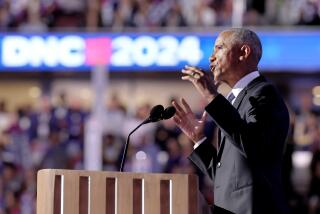Some GOP Hopefuls Hedge Bets With Clinton Tie-Ins
- Share via
CHICAGO — President Bush’s ferocious efforts to portray Bill Clinton as an unreconstructed liberal are running into static from an unexpected source: Republican Senate candidates.
From New York to Oregon, in at least five different states where Bush badly trails the Democratic presidential nominee, Republican Senate hopefuls are hedging their bets by emphasizing similarities between their views and the Arkansas governor’s on issues such as the death penalty and the line-item veto.
“Running away from Bush and trying to find some link to Clinton has become standard operating procedure in Republican campaigns in the past couple of weeks,” says Democratic pollster Geoff Garin. “They are looking at their presidential polls, and they see a giant wave coming at them.”
All this represents a stark contrast to the last 12 years--when it was Democratic Senate and House candidates who struggled to survive landslide repudiations of their presidential nominees. Now in huge rallies from downtown Chicago to Eugene, Ore., Democratic candidates are eagerly sharing platforms with Clinton--and using ads to tie their opponents to Bush.
“In the last three presidential elections, it’s been Republican House and Senate candidates who have attempted to grab onto Republican coattails and force Democratic nominees to either embrace or disavow their presidential nominees,” says Stuart Rothenberg, editor of the Political Report, a Washington-based newsletter that tracks congressional races. “This time, it’s the reverse.”
Even as he keeps a nervous watch on Bush and the surge of support for independent candidate Ross Perot, Clinton over the last week has stepped up his efforts to bind other Democratic candidates to his own campaign. Clinton now commonly tells audiences that if they like his ideas they need to send Democrats to Congress who will support them. “I need help to implement that program for change,” he said at a rally in Eugene last week with Rep. Les AuCoin, the Democratic Senate candidate in Oregon.
Even if Clinton maintains his lead through election day, it’s not clear how effective such arguments will be: Since the 1960s, even sweeping presidential victories have produced coattails only sporadically. But there’s no question that Republican candidates are behaving as though they fear being caught in an undertow.
In Illinois, where Bush trails by more than 20 points in recent surveys, Republican Senate candidate Rich Williamson cited Clinton more often than the President during his final debate last Thursday with Democrat Carol Moseley Braun.
Williamson was so eager to identify with the Arkansas governor during the debate that he praised Clinton on issues where the two men, in fact, disagree: Williamson, for instance, tied his views to Clinton on the question of school choice, though Clinton only supports public school choice, not the private school vouchers that Williamson backs.
In Oregon, which Bush has virtually written off, supporters of GOP Sen. Bob Packwood handed out fliers at Clinton’s huge rally in Eugene last week pointing out issues where AuCoin disagrees with both Packwood and Clinton. While Bush accuses Clinton of waffling on the Persian Gulf War, Packwood cites the Arkansas governor as a fellow supporter of military action, in an effort to isolate AuCoin, who voted against the use of force in the Persian Gulf.
During the rally itself, Packwood called a press conference in a Eugene men’s store, where he stood next to a mannequin in a tuxedo and somewhat improbably declared: “The only coattails we’ll see in this election will be on this fellow right next to me.”
In Wisconsin, where Bush also lags, Republican Sen. Bob Kasten told an editorial board that he is closer to Clinton’s ideology than is his opponent, Democratic state Sen. Russell Feingold.
In Pennsylvania, where Bush’s deficit has approached 20 points in recent surveys, Republican Sen. Arlen Specter has run television ads citing Clinton’s support for the death penalty to buttress his criticism of his opponent Lynn Yeakel’s opposition to it. Specter’s campaign has also distributed to reporters a memo claiming that among Republican senators he has voted “most often against the Reagan and Bush Administrations.”
In New York, where Bush faces a potential blowout, conservative Republican Sen. Alfonse M. D’Amato has repeatedly declared his closeness to Clinton on the death penalty and the North American Free Trade Agreement--though Democrat Robert Abrams’ qualified support for the deal is actually closer to Clinton’s position than is the senator’s.
Publicly, GOP officials say these arguments are aimed not at creating distance from Bush, but at portraying Democratic rivals as outside the mainstream of their own party. When citing Clinton, these GOP candidates usually refer to Bush as well, declaring that they agree with both the President and Clinton on issues such as the death penalty, while their opponent does not.
In an interview at a Williamson fund-raising luncheon in Chicago last Friday, Texas Sen. Phil Gramm, chairman of the National Republican Senatorial Committee, denied that these tactics represent an abandonment of Bush. “I don’t see a movement of people away from the President,” he said.
Still, while the President is trying to paint Clinton as a dangerous liberal, it is remarkable for so many Republicans to be raising the Democrat as a symbol of moderation. “It’s proving our point that Bill Clinton is a different kind of Democrat,” says George Stephanopoulos, Clinton’s communications director.
Despite Gramm’s assertion, other observers say the tactic also shows that GOP candidates are eager to find a safe harbor from the storm apparently brewing against the President in many states.
“If this isn’t distancing from Bush, what is it?” says Rothenberg. “It’s a recognition that Bush is in deep trouble in state after state, and that it’s wise to try to make Democratic voters comfortable with you as a Senate candidate--to show that you could work with Bill Clinton.”
Adds one well-placed GOP operative working with both Senate and House candidates: “The reason they are doing this is Bush’s numbers are so low that they have to run 25 points ahead of him in some states to win.”
In the campaign’s final days, the strategist says, it is likely that GOP candidates will air ads showing typical voters explaining why they are voting for Clinton or Ross Perot--and their incumbent Republican senator.
These GOP rhetorical maneuvers have set in motion an intricate minuet. As fast as Republicans try to embrace Clinton, their Democratic opponents are trying to pin them back in Bush’s embrace.
When Feingold appeared with Clinton at a rally in Milwaukee last week, he delivered a sharp needle to Kasten: “I’m beginning to wonder if he’s even going to vote for George Bush,” Feingold said of Kasten. “I know who I’m going to vote for.”
In Illinois, Braun has run television ads tying Williamson--a former official in Ronald Reagan’s White House--to “Reagan-Bush-Williamson economics.” In Pennsylvania and New York, Yeakel and Abrams are also running ads linking their Republican opponents to Bush.
During a debate earlier this month, AuCoin turned to Packwood and dramatically asked if he was going to vote for Bush. Packwood criticized Bush’s economic performance but defended the President as “a man of decency.” AuCoin then labeled Packwood and Bush as “teammates.” The Democrats now are running ads that tie Packwood to Bush’s tax policies.
“Packwood has been there time and again for George Bush, and we are going to hang that around his neck like a noose,” says Rachel Gorlin, AuCoin’s press secretary.
For all this jostling, it remains unclear how much influence the presidential race will exert on congressional contests. There’s no clear pattern in the races where Republican Senate candidates have reached out to Clinton: Packwood and Specter lead, D’Amato and Kasten trail but remain competitive and Williamson faces a substantial, though somewhat narrowing, deficit with Braun.
In the last eight presidential elections, only the landslide victories of Lyndon B. Johnson in 1964 and Reagan in 1980 have swept along significant numbers of their party’s congressional candidates with them.
Some analysts believe that this election could resemble 1980, with voters’ disappointment at an incumbent President also washing over his party’s candidates for House and Senate. “Throwing out an incumbent generates a kind of negative momentum across the board,” says Thomas E. Mann, director of the government studies program at the Brookings Institute.
But two other factors weigh against that possibility. One is an anti-incumbent mood that could hurt Democrats, who have the most House and Senate seats to defend. While a strong Clinton tide could help Democratic challengers, it may do little to defend embattled incumbents swimming upstream against an anti-Washington current, acknowledges Laura Nichols, communications director of the Democratic Congressional Campaign Committee.
Another complication is the potential of a large vote for Ross Perot--which could both intensify the anti-incumbent sentiment and defuse the presidential race’s partisan impact. If Perot’s showing keeps down Clinton’s total vote in states where the front-runner now leads handily, it may prevent a Democratic surge from developing down the ballot, says GOP pollster Neil Newhouse.
“Even in states where Bush is likely to lose, it does not appear to me Bill Clinton is going to get significantly over 50%,” Newhouse says. “I would be a lot more concerned in some of these states Bush is going to lose if it was a two-man race.”
Still, Democrats are basking in the unaccustomed glow of a national standard-bearer running so strongly that candidates are eager to appear with him in the chill of the election’s final days. At a rally in Missouri last week, House candidate Pat Deaton did everything but jump into Clinton’s coat pocket.
“Some people say I’m trying to get to Washington on Bill Clinton’s coattails,” Deaton said. “That’s not true, I’m tying my shoelaces to his shoelaces.”
Times staff writer David Lauter contributed to this story.
Today on the Trail . . .
Gov. Bill Clinton campaigns in Winston-Salem, Highpoint, Durham, Wilson and Greenville, N.C.
President Bush campaigns in Billings, Mont.; Denver; Albuquerque and Des Moines, Iowa.
Ross Perot has no public events scheduled.
TELEVISION
Ross Perot airs a one-hour commercial on ABC after Monday Night Football.
Bill Clinton and Al Gore are guests on CBS’ “This Morning” at 8 a.m. PST.
Vice President Dan Quayle is a guest on ABC’s “Good Morning America” program at 7 a.m. PST.
C-SPAN may air repeats of the presidential debates. For updated program schedules, call C-SPAN at 202-628-2205.
More to Read
Get the L.A. Times Politics newsletter
Deeply reported insights into legislation, politics and policy from Sacramento, Washington and beyond. In your inbox twice per week.
You may occasionally receive promotional content from the Los Angeles Times.










